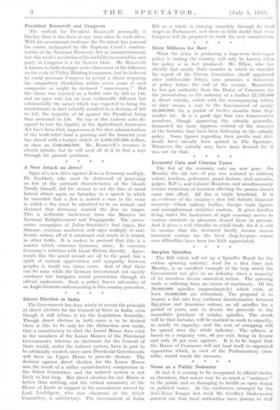President Roosevelt and Congress The outlook for President Roosevelt personally
is blacker than •it has been at any time since he took office. With his accustomed resilience the President has pursued his course undaunted by the Supreme Court's condem- nation of the 'National Recovery Act as unconstitutional, but this week's revelation of his inability to control his own party in Congress is a far heavier blow. Mr. Roosevelt is known to hold stronger views than most of his followers on the evils of Utility Holding Companies, but he believed he could persuade Congress to accept a clause requiring • the compulsory dissolution within seven years of such companies as might be declared " unnecessary." But the clause was rejected on a ballot vote by 216 to 146, and an open vote (on an issue technically different but substantially the same) which was expected to bring the recalcitrants to heel actually resulted in a division of 257 to 147, the majority of 80 against the President being thus increased to 110. On top of this various suits de- signed to test the legality of the Agricultural Assistance Act have been filed, impatience at the slow administration of the work-relief fund is growing and the financial year has closed with a budget deficit of 3,486,237,000 dollars; or close on £700,000,000. Mr. Roosevelt's resource as almost infinite, but he will need all of it to find a way through his present problems.














































 Previous page
Previous page